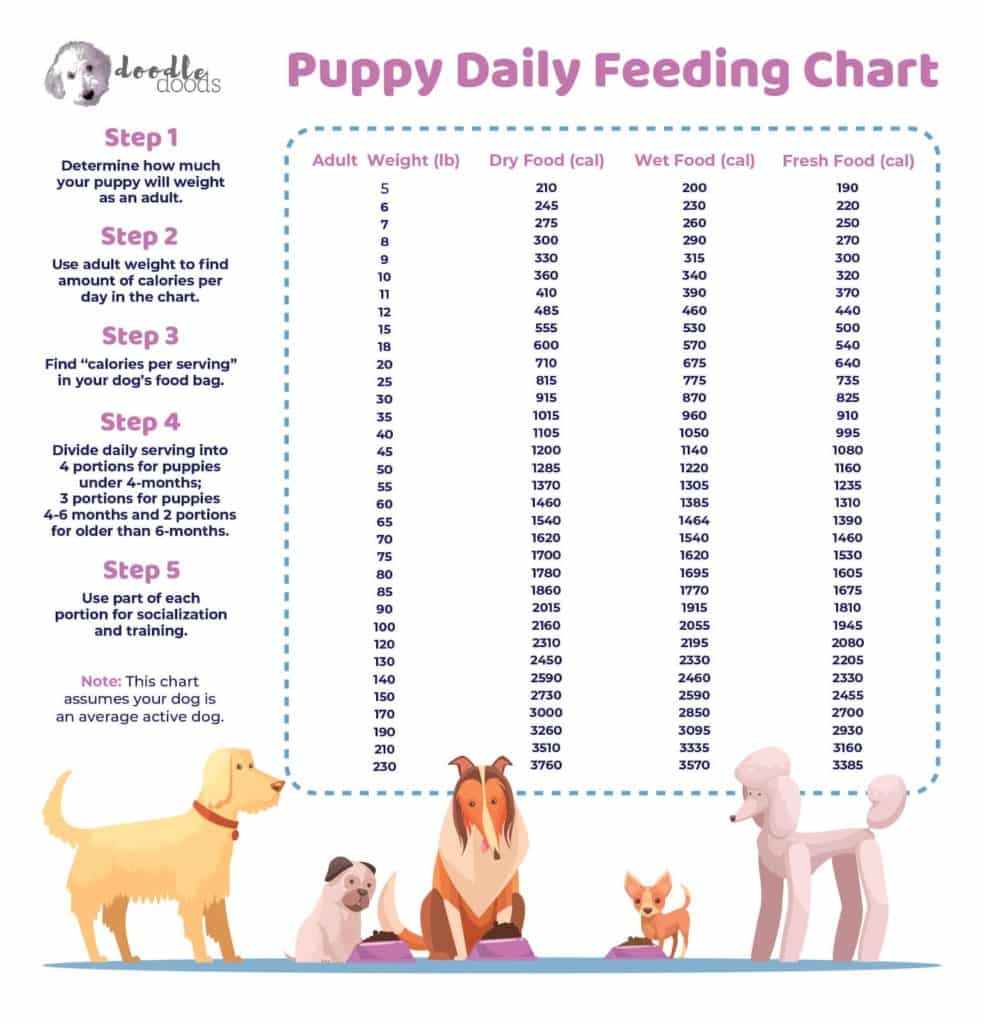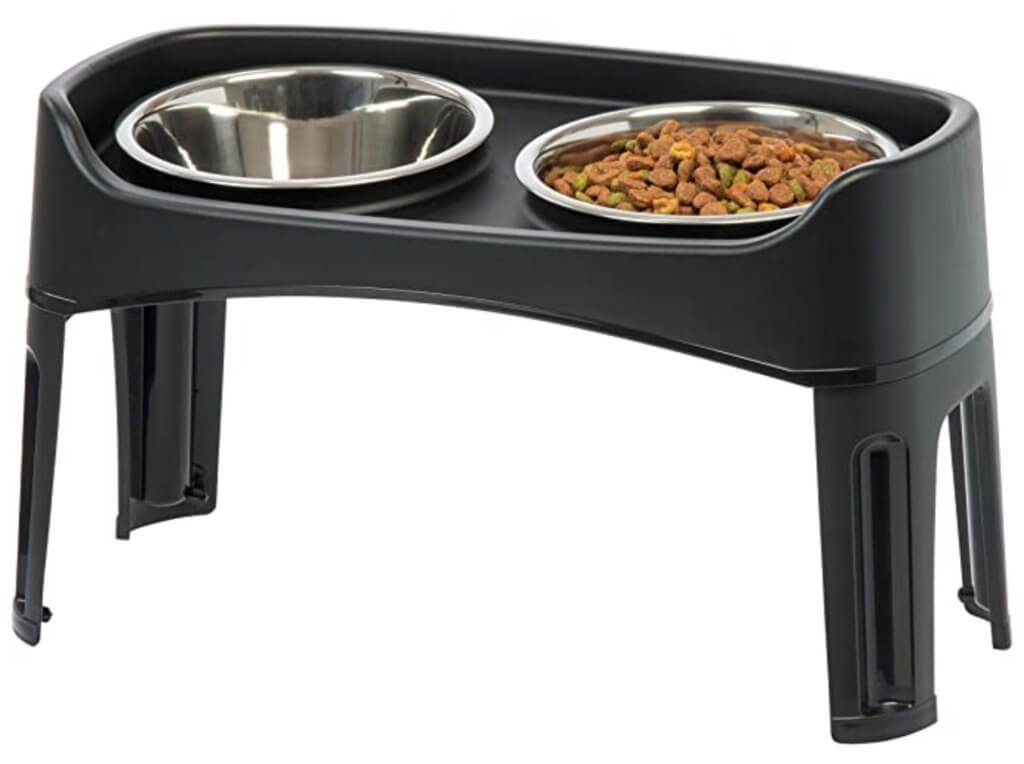How Much Should I Feed My Puppy Calculator
Just like us humans, dogs need a healthy and balanced diet to live a long and fulfilling life. But you might be wondering, how much should I feed my dog? How often? And what about puppies? Let's dive into everything you should know about feeding your dog. You can also use our easy-to-use, accurate dog food calculator, which is just above this paragraph!
All dogs need the right amount of high quality dog food. Feeding your pup too little can result in nutrient deficiencies. On the other hand, overfeeding your dog can lead to obesity. Of course, a lil' chubby pet looks cute, but an overweight dog can develop other health issues that can drastically change their lifespan and quality of life.
Overweight dogs may suffer from diabetes, joint problems and arthritis, thyroid issues, develop cancer, heart and skin problems or have a difficult time breathing properly.
On the other hand, under feeding your dog or feeding them with low quality dog food can deprive their bodies of vital nutrients. If your pup does not get enough nutrients, they may develop skin and hair problems, digestive issues, experience lack of energy and even depression.
How Much Should I Feed My Dog?
How much to feed a dog is based on their age, size, weight and of course their overall health. Every dog is unique and one size does not fit all. The simplest place to start at is by asking your vet what your dog's ideal adult weight range is and calculating their needs based on that.
If you adopted your pup from a reputable breeder, they should be able to tell you the weight of your dog's same-sex parent. This can be a great tool to determine how big your dog should ideally be when reaching adulthood.
Furthermore, the amount of food your dog needs also depends on how much they exercise (i.e. how much energy they spend and thus require). If you have a rather lazy-natured dog, they probably need a little bit less food. If your dog never sits still, they might need a bit more.
Also, keep in mind that pregnant or nursing dogs have different needs while taking care of their little ones. Same goes for dogs recovering from surgery or illness. On the other hand, senior dogs usually have lower energy requirements and thus need a bit less food to avoid obesity.
Dog Feeding Chart
There are many great dog feeding charts out there that can be helpful in determining your dog's needs. Here is a great recommended daily feeding chart that shows roughly how many calories your dog should eat daily.

Look at the calories rather than the cups. Dog foods can vary in caloric density and cups alone might not be an efficient way to maintain your dog's health and weight.
How Often Should I Feed My Dog?
We all know dogs love to eat…all the time. Looking into those cute – although often manipulating – eyes and trying to say no to them can be tough. But keep in mind that you're doing this for of your pup's health.
Feeding your dog twice a day should be perfectly enough. Some owners even feed their dogs once a day, which can also be acceptable (discuss this with your vet first!). Keep in mind that this only applies to fully grown adult dogs. We'll cover puppies a bit later on in this article.
Should I Free Feed My Dog?
For some dogs, the free-choice or free-feeding method works great, especially for pregnant and nursing dogs.
If you have an active pup, you can calculate the exact amount of food they need daily and leave out that amount for the whole day. They might enjoy grazing throughout the day and won't overeat in one go.
However, for many dogs, the timed feeding method works best. It's especially not recommended to leave limitless food out if you have more than one dog.
What Time of Day Should I Feed My Dog?
If you feed them twice daily, your dog's meal times should be around the same time every day and in 8-12 hour intervals. So for example, feed them at the same times when you have breakfast and dinner. These could be at 8 AM and 7 PM.
Setting the feeding times for your doggo helps regulate their metabolism and digestion. It can also encourage good behavior at mealtimes and helps them bond with the family. But as with anything, you should consult your dog's feeding schedule with your vet first.
How Much to Feed a Puppy
Now that we've covered how much adult dogs should eat, let's have a look at puppies. So how much should I feed my puppy? As they are growing and developing, puppies do need more frequent meals and more energy.
You'll probably be able to bring your pup home when they're around two months old. Before that, they should be able to feed on their mother's milk as much as they want. Typically, the breeder will have already introduced puppy food before you take yours home. If not, you can start introducing puppy food and scheduled meal times at around 4 to 12 weeks of age. (But we absolutely recommend you discuss this with your vet and follow the exact requirements for your pup.)
From 8 to 12 weeks old, puppies should be fed around 3-4 times a day. Around 4 to 5 months of age, they should start eating 3 times a day. After around 6-7 months, you can start adjusting your dog to 2 meals per day.
Moreover, do not feed your puppy adult dog food until they've reached their adult size. Puppies need to grow and develop and thus they need more nutrients and calories. Your vet will be able to recommend high quality puppy food that takes into account all of your pup's needs.
Puppy Feeding Chart by Age
Below is a good, generalized puppy feeding guide and puppy feeding chart by age.
| Age | Frequency |
| 8-12 Weeks | 3-4 times/day |
| 4-5 Months | 3 times/day |
| 6-8 Months | 2 times/day |
| 9-11 Months | 2 times/day |
| 1-2+ Years | 2 times/day |
Here's another useful chart that shows the caloric requirements for puppies based on how much they'll weigh once grown up:

Puppy Feeding Schedule
What are the Best Times to Feed a Puppy?
If your puppy eats 3 times a day, we recommend you schedule the feeding times around the same time you have your meals. This is also a great time for socialization with the family. The last meal of the day should be around 5 PM, so your puppy has time to digest and poop before nighttime.
Other Puppy Feeding FAQs
How Do I Know if I'm Feeding My Puppy Enough?
You can easily monitor this by looking at your puppy's body composition starting from 8-10 weeks of age. Puppy's ribs, spine and pelvic bones should not be visible. The outline of the ribs and your puppy's waist should be seen. If they're overweight, their stomach is more rounded, and ribs and waist won't be visible.
Can You Overfeed a Puppy?
Yes, feeding your puppy too much can cause obesity, digestive issues and other problems with their development. If a puppy is overweight, there's a bigger chance of obesity once they're adults.
When Can Puppies Eat Dry Food Without Water?
At around 8 weeks, puppies should have all of their baby teeth and will be able to start eating dry food. Nevertheless, your puppy might need some time to adjust. For the transition period, mix the dry food with some water. You can add less water every few days.
When to Switch Puppy to Dog Food?
You can switch to adult dog food once your dog has grown to its full size. Have a look at the Petfinder puppy feeding guide above. And of course, follow the guidelines given by your vet, as each dog is unique.
Generally, toy dogs reach their adult size by 11 months, small and medium dogs by 13 months, large dogs by 16 months, and giant dogs by 24 months.
When to Switch Puppy to 2 Meals a Day?
Usually around 6 months of age, you can start feeding your puppy 2 times a day. However, for some larger and giant breeds that are prone to GDV, feeding 3 times a day might be recommended even after that.
Are Elevated Dog Bowls Safe?
Some sources claim that bigger dogs will benefit from elevated dog bowls. Elevated feeding bowls might be useful in cases of joint problems and arthritis in large and giant dogs. However, there is still the misconception that elevated dog bowls reduce bloat in large dogs.

Large and giant breed dogs are more prone to bloat and gastric dilatation-volvulus (GDV), which can be a life-threatening condition. A study by Ronald M. Bright concluded that eating from an elevated dog bowl is actually one of the risk factors of GDV. (Source)
Another study looked at risk factors associated with GDV. Results showed that around 20% of GDV cases in large breed dogs were attributed to eating from an elevated bowl. For giant breed dogs, the percentage was around 52% of the cases. (Source)
Dog and Puppy Food Calculator
To make things a bit easier, try out our Dog Food Calculator all the way at the top of this page. It is a dog and puppy calorie calculator that conveniently converts calories into cups per day!
Calculator pulls formulas from The Ohio State University's Veterinary Medical Center.
To conclude, it might be tempting to give in to those cute little beggars who'd love for you to share everything you eat with them. However, having a proper feeding schedule and right amounts in place helps enforce good behavior and overall quality of life.
The information on this page is for informational purposes only. It is not intended to be a substitute for qualified professional veterinary advice, diagnosis, or treatment. Always seek the advice of your veterinarian or other qualified animal health provider with any questions you may have.
Source: https://doodledoods.com/how-much-should-i-feed-my-dog-calculator/
0 Response to "How Much Should I Feed My Puppy Calculator"
Post a Comment